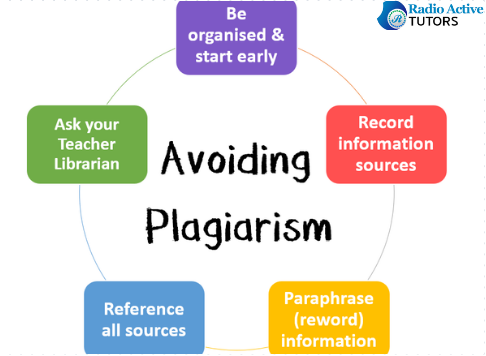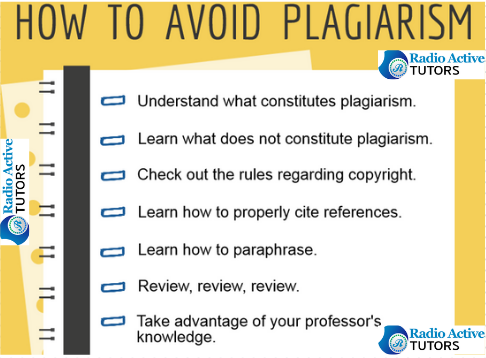Introduction
Plagiarism, the act of presenting someone else's work, ideas, or words as your own, is a serious offense in academic and professional settings. It not only undermines your credibility but also violates ethical standards and can lead to severe consequences. To produce original, authentic work, it's essential to understand how to avoid plagiarism. This comprehensive guide will explore the various aspects of plagiarism, its consequences, and practical strategies for preventing it in your work.

I. Understanding Plagiarism
Plagiarism encompasses a wide range of activities, from verbatim copying to more subtle forms of content appropriation. It is essential to recognize the various forms of plagiarism to avoid inadvertently engaging in these practices:
Direct Plagiarism: This is the most blatant form of plagiarism, involving the verbatim copying of someone else's work without proper attribution. It includes copying text from books, articles, or online sources without using quotation marks or citations.
Paraphrasing without attribution: Paraphrasing is rewriting someone else ideas or text in your own words. However, failing to provide proper citations for paraphrased content is a form of plagiarism.
Inadequate Citation: Even when you intend to credit the original source, if you do not provide proper citations or use the correct citation style, it can still be considered plagiarism.
Self-Plagiarism: Reusing your own work, particularly without proper citation, is also a form of plagiarism. It can occur when you submit the same paper to multiple courses or journals without disclosure.
Patchwriting: Patchwriting involves rephrasing someone else's text in a way that retains a substantial portion of the original phrasing. This is considered a form of plagiarism because it lacks originality and proper attribution.
II. Consequences of Plagiarism

Understanding the potential consequences of plagiarism is crucial in recognizing the importance of avoiding it:
Academic Penalties: In educational settings, plagiarism can result in failing a course, receiving a reduced grade, or academic suspension.
Reputation Damage: Plagiarism damages your credibility as a student, researcher, or professional. It can have lasting effects on your reputation and hinder future opportunities.
Legal Ramifications: In some cases, plagiarism can lead to legal action, particularly in professional and publishing contexts.
Ethical Violations: Plagiarism is not only a violation of academic and professional standards but also an ethical breach, as it involves dishonesty and deception.
Loss of Trust: Plagiarism erodes the trust of peers, colleagues, and instructors, affecting your relationships within academic and professional communities.
III. Strategies to Avoid Plagiarism

Preventing plagiarism requires a combination of ethical considerations and practical strategies. Here are essential steps to help you avoid plagiarism in your work:
Understand Proper Citation Styles:
Familiarize yourself with the citation style required in your field (e.g., APA, MLA, Chicago, Harvard). Each style has specific rules for citing sources, so be sure to follow them accurately.
Cite All Sources:
Whenever you use someone else's work, ideas, or words, provide proper citations. This applies to direct quotations, paraphrased content, and even ideas inspired by others.
Use Quotation Marks:
When incorporating verbatim text from a source, enclose it in quotation marks. This clearly indicates that the content is not your own.
Paraphrase Effectively:
When paraphrasing, rephrase the content in your own words and style while retaining the original meaning. Ensure that the paraphrased content is significantly different from the source.
Cite Yourself:
If you are referencing your previous work, provide proper self-citations. Acknowledge your previous publications or assignments as you would any other source.
Keep Detailed Records:
Maintain organized notes and records of all the sources you consult during your research. This will make it easier to cite them accurately.
Use Citation Management Software:
Tools like Zotero, EndNote, or Mendeley can help you manage and format citations efficiently. They integrate with word processors to generate citations and bibliographies.
Properly Attribute Ideas:
It's not just direct quotes and paraphrased text that require citation. Ideas, concepts, and theories borrowed from others should also be attributed to the original source.
Seek Permission for Reuse:
If you wish to reuse content from your own or others' published work, seek permission and clearly acknowledge the source.
Educate Yourself:
Invest time in learning about plagiarism and academic integrity. Many universities and institutions offer resources and tutorials on these topics.
Use Plagiarism Detection Tools:
Plagiarism detection software, such as Turnitin or Copyscape, can help you identify unintentional plagiarism by comparing your work with a vast database of academic and online content.
Plan Your Time Wisely:
Procrastination can lead to rushed and poorly cited work. Allocate ample time for research, writing, editing, and citation to avoid last-minute mistakes.
Acknowledge Collaborators:
When working on group projects or research with others, clearly identify each contributor's role and give credit where it is due.
Revise and Proofread:
After completing your initial draft, review your work for proper citations, clarity, and coherence. Proofreading can help you catch unintentional instances of plagiarism.
Consult Style Guides:
Refer to official style guides (e.g., the Publication Manual of the American Psychological Association for APA style) for specific citation rules and examples.
IV. Ethical Considerations
Beyond the technical aspects of avoiding plagiarism, it's essential to understand the ethical implications of this practice. Embrace the values of academic and professional integrity, honesty, and originality. Here are some ethical considerations:
Academic and Professional Honesty : Uphold the principles of honesty and integrity in your academic and professional pursuits. Plagiarism undermines these values.
Respect for Intellectual Property: Recognize and respect the intellectual property of others. Proper citation is a way of acknowledging their contributions.
Originality and Contribution: Strive to produce original work that contributes to your field or discipline. Plagiarism inhibits your capacity for original thought and creativity.
Transparent Collaboration: In collaborative projects, ensure that contributions are transparent and fairly attributed to each team member.

Conclusion
Avoiding plagiarism is not just a technical exercise in citation; it's a fundamental commitment to ethical conduct, originality, and academics or professional integrity
